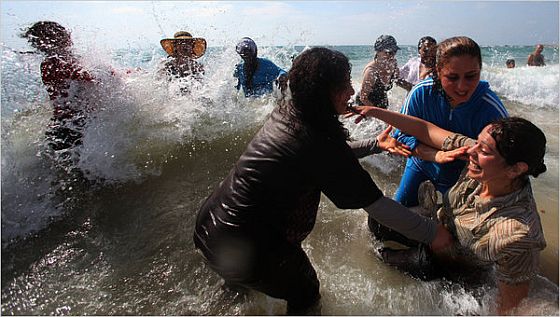At Mondoweiss, Philip Weiss writes:
DailyKos has acted to ban commenters from linking to Mondoweiss, charging me with anti-Semitism. It is a disgraceful smear and hides DailyKos’s real anxiety: it cannot deal with the issue of Palestinian human rights, any more than the Democratic Party can, and so Israel supporters are striking at me.
Their point of attack is my repeated insistence on talking about the large Jewish presence in the American establishment and the importance of Jewish money in the political process. Such an attack was inevitable, and in that sense I welcome it. For while these are delicate issues, they are important ones. I have often expressed my own discomfort with them, and yet I advance them in the discourse because as a journalist I recognize that they meet an ancient test of what is newsworthy: these issues are new, true, and important. Were they merely new and true, I would ignore these issues. But their importance has put them in my road, and I can’t shy away from discussing them, and DK’s smear gives me an opportunity to revisit my thinking.
Why is the Jewish prominence in the American establishment an important issue? For a few reasons. 1, it is a development I witnessed myself and celebrate as a Jew. When I was growing up, we were excluded from the turrets of the American system by anti-Semitism. Today that is not the case. Jews should recognize this new reality, celebrate it, and yes, allow it to affect our consciousness of our unfolding historical position in western society. 2, It deeply affects Middle East policy, which is the true source of my difference with Daily Kos; I believe you cannot talk about the Israel lobby without addressing the Jewish presence in the establishment. And following directly from that, 3, the Jewish presence is not neutral– no, sadly (and because of the Holocaust), my community has been indoctrinated with Zionism.; as J Street’s Steven Krubiner said the other night, Jewish identity education includes Loving Israel. Well, I think Zionism is a form of anachronistic nationalism that has served to oppress the Palestinians and helped lead my own country into war, and in seeking to uproot Zionism inside Jewish life, I have repeatedly pointed out that the ideological basis of Zionism is the idea that we are unsafe in the west, a claim that is patently absurd in the face of our achievement in the United States and our prominence in the establishment– which everyone knows about and accepts, but DailyKos finds it anti-Semitic even to mention.

